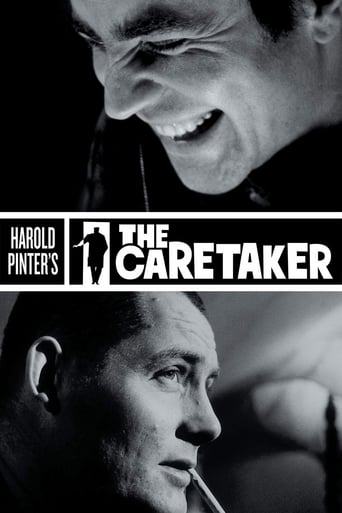kijii
This film was made from Harold Pinter's first successful stage play of the same name. The play has only three characters and no clear-cut plot. (It is part of "Theater of the Absurd," movement of the time.) Yet, it was so powerful on stage that Clive Donner, Michael Birkett, and Donald Pleasence wondered about making into a film. Once Harold Pinter approved of the project, the financing—even for such a small film--was difficult since it was assumed that mass audience appeal would be limited. In the end, its financing and co-production was dependent on other actors and playwrights of the time, such as Elizabeth Taylor, Richard Burton, and Noel Coward.As the movie opens, we see two men walking down the street on a bitter cold day. One man, Bernard Jenkins (Donald Pleasence) seems to be a vagrant. He is doing all the talking as the taller more reserved man, Aston (Robert Shaw), is taking him to his house after protecting him a downtown brawl. After the two climb the long spiral stairs to the upper story of a large rundown house, Aston invites Jenkins to come into his room and warm up. He asks what he can do for him. When Jenkins says he needs some new shoes, Aston tries to give him a pair of his shoes. But, they are too small for Jenkins. All of Jenkins' comments are met with short polite answers or affirmations from Aston. Aston's personality seems flat (almost mechanical) as he continually refers to restoring the shed in the backyard. That seems to be his goal in life since as he says, "I'm good with my hands, you see." When Aston says he has to go out, Jenkins gets up to leave, But, Aston says that he can stay in spite of him not being with him in the house. So, Aston leaves and Jenkins stays.Next, the third character enters the play-on-film: Mick (Alan Bates).When he comes into the room, Jenkins is taken back since Mike says that he is the proprietor of the building. Jenkins, who is there because of Aston, doesn't know how to respond. Mick is more acerbic than his brother, Aston. He never asks Jenkins to leave, but he is still cruel to him as he brags about his plans to restore the place. He implies that his brother is a slow worker and hasn't got much done. Jenkins then identifies with Mick in order to stay there. When Mick asks Jenkins to be the caretaker of the place and help fix it up—which Jenkins had already agreed to do with Aston--Jenkins agrees. When Aston returns, there is a very short scene with all three characters in the one room. Not much is said or implied about the relationship among these three characters. When Mick leaves, Aston tell Jenkins his personal story in simple terms. As a minor and without his consent, he was subjected to electric shock treatments in a mental hospital. The reason, he says, was based on 'lies' that were told at a local café. After hearing the story, Jenkins senses that his way into the staying in the rundown room lies with Mick- -and not Aston. But, later when Jenkins starts to put down Aston to Mick, Mick refuses to say that there is anything wrong with his brother. In fact, he attacks Jenkins for implying such a thing.The puzzle for Jenkins is to figure out which 'horse to back' between these two brothers: how best can he assure his 'caretaker' role in this rundown house. Jenkins is always the outsider trying to get in. But, he is unable to pry his way between these two brothers that need each other in some unspoken way. Each of the three characters has pipe dreams. And their pipe dreams are—in some way--dependent on one of the other two. But, since their dreams remain unspoken, the riddle is who will win and who will lose…and why.
hte-trasme
Almost needless to say, this is an adaptation of Harold Pinter's play "the Caretaker." The play is a great one -- combining cryptically poetic language with impeccably-tuned character tension. This film hews very close to the play and its contributions do nothing but do justice to its very special material. Alan Bates, Robert Shaw, and Donald Pleasance create their characters beautifully and completely, such that the sparks (sometimes overt, sometimes right beneath the surface) fly rivetingly when they interact. Everything about how the film is shot compliments the atmosphere of oppressive desperation, such that this tight film about - essentially - three in and out of a cluttering room involved in invested discussion about shoes, interior decorating, and getting down to Sidcup becomes hypnotically compelling.
rufasff
This hard to find movie is now availible on an import DVD (with that "opened up" car scene) and it's worth seeking out. It's almost as good as the excellent"Homecoming" film, and while Bates and Shaw shine, it is Donald Pleasancewho steals the show. How this great actor ended up in grade Z films at the end of his career must be a sort of tragic drama in itself. It's wild to remember this "kitchen sink" classic came out of England the year the Beatles took the world by storm. Those were the days.....
rosscinema
I have also been searching for this film on DVD or video but I can't find it either. I've seen it 3 or 4 times on PBS in the last twenty years or so and its a tough one to locate. I think it's Robert Shaw's best performance. So emotional without being emotional! The silence in this film is like a constant scream of pain. Low budget but I think that helps the film by enhancing the performances. If anyone finds a copy let me know. I guess I'll wait for PBS to show it again sometime and I have a blank tape ready!



